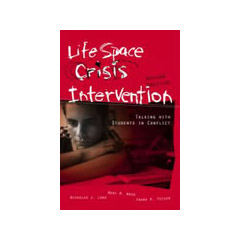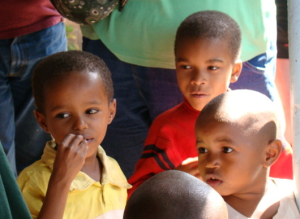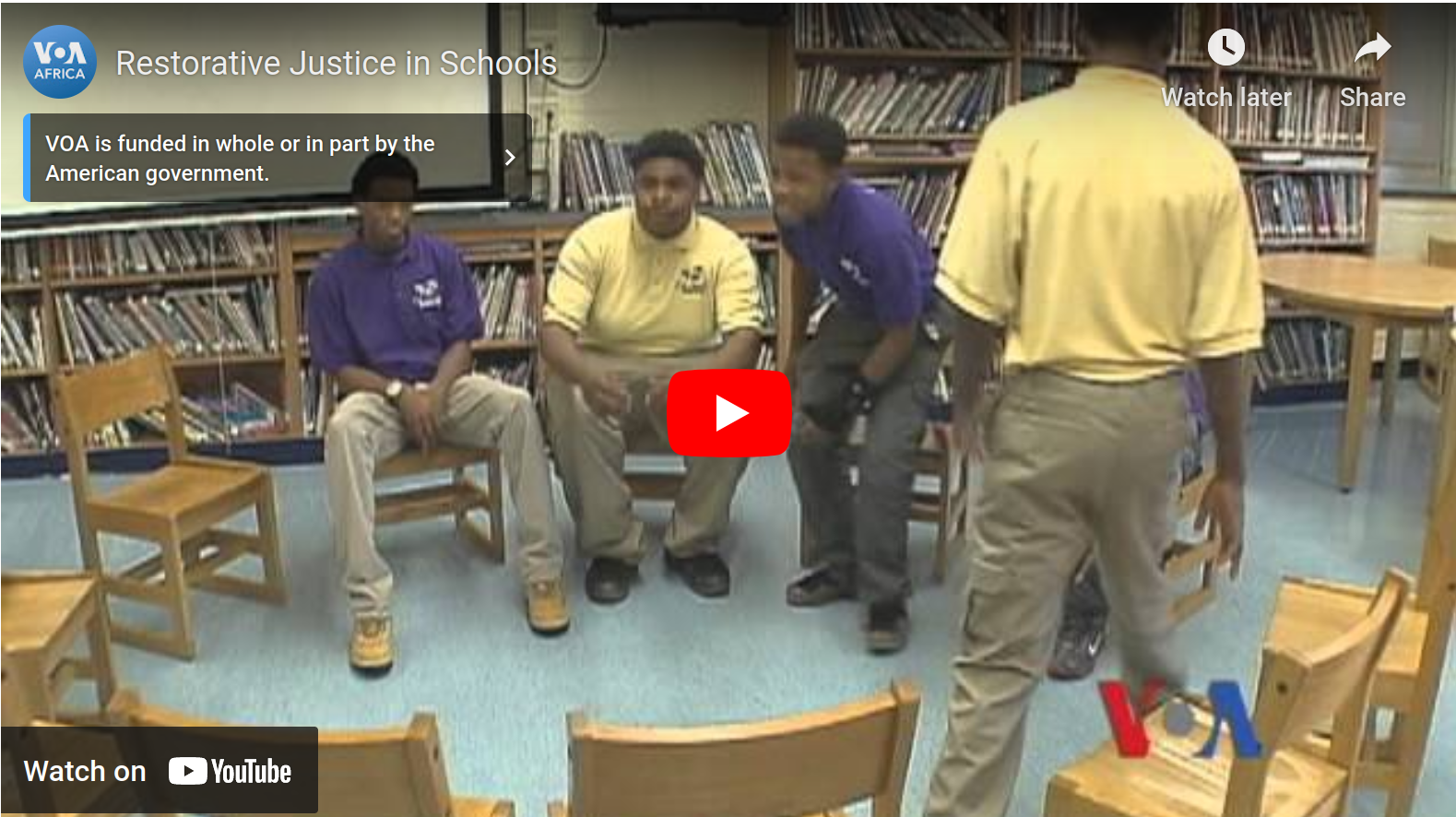News & Announcements
- Details
- Written by Joshua Wachtel
 During the summer term, IIRP is offering two new courses in a fully online format, "Restorative Justice in Communities" and "Restorative Practices in Life Space Crisis Intervention." Both classes are 600 level classes, however they only require Basic Restorative Practices (RP 500) as a prerequisite.
During the summer term, IIRP is offering two new courses in a fully online format, "Restorative Justice in Communities" and "Restorative Practices in Life Space Crisis Intervention." Both classes are 600 level classes, however they only require Basic Restorative Practices (RP 500) as a prerequisite.
Assistant professor Dr. Craig Adamson will be teaching RP 622, Restorative Justice in Communities. Craig says that this course looks into what's happening at the local level regarding restorative justice and restorative practices.
The textbook for this course is Dan Van Ness and Karen Heetdersk Stong's Restoring Justice, Fourth Edition: An Introduction to Restorative Justice, a broad overview of the theory and practice of restorative justice. Students also examine the most current research to get a sense of how restorative justice is developing around the world and the current state of practice.
- Details
- Written by Joshua Wachtel
This animated video walks through a family group decision making conference (FGDM) from a child's perspective. It could certainly be used to educate people, but I could also see it being very useful to help children understand what to expect about FGC/FGDM conferences.
- Details
- Written by Laura Mirsky
 “Restorative practices helped me look at what I did wrong instead of always blaming other people,” says Joe RoyEighteen-year-old Joe Roy has been on a bumpy journey, but now he’s excited to launch himself into life.
“Restorative practices helped me look at what I did wrong instead of always blaming other people,” says Joe RoyEighteen-year-old Joe Roy has been on a bumpy journey, but now he’s excited to launch himself into life.
When he moved to a CSF group home and enrolled at CSF Buxmont’s Sellersville school at 16, Joe’s life was in turmoil. (Community Service Foundation and Buxmont Academy are model programs of the IIRP dedicated to providing education, counseling, foster care and other services to help young people and their families grow and change through restorative practices.) Joe's biological mother had given him up for adoption; then his adoptive parents rescinded their guardianship.
For months, Joe stirred up trouble at CSF, resisting authority and “exciting near riots” among his fellow students, says CSF Assistant Director of Day Treatment and International Institute for Restorative Practices (IIRP) Graduate School alumna Pam Thompson.
Joe himself says, “I was oppositional. And I didn’t like to hang out with people.” When Joe’s behavior crossed the line for the umpteenth time, he was told it was up to him to convince CSF to allow him to stay.
- Details
- Written by Joshua Wachtel
During the past year, two new Assistant Professors, Dr. Craig Adamson and Dr. John Bailie, have both been named to the IIRP faculty.
 Since 1995, Craig Adamson has worked in IIRP's model programs, Community Service Foundation and Buxmont Academy (CSF Buxmont) in both counseling and administrative positions. Craig continues to serve as Executive Director of these organizations, whose services include day treatment/alternative education, in-home and community-based counseling, foster care and conferencing programs for at-risk youth and their families in eastern Pennsylvania. Craig's dedication to introducing restorative programming in community-based settings, empowering families, keeping youth connected to their families and providing quality restorative services to families and youth is central to his work at CSF Buxmont.
Since 1995, Craig Adamson has worked in IIRP's model programs, Community Service Foundation and Buxmont Academy (CSF Buxmont) in both counseling and administrative positions. Craig continues to serve as Executive Director of these organizations, whose services include day treatment/alternative education, in-home and community-based counseling, foster care and conferencing programs for at-risk youth and their families in eastern Pennsylvania. Craig's dedication to introducing restorative programming in community-based settings, empowering families, keeping youth connected to their families and providing quality restorative services to families and youth is central to his work at CSF Buxmont.
In addition to his experience and knowledge in administration and providing direct services to youth, Craig is also developing new online courses for the IIRP graduate school and bringing in leading edge thinkers from around the world. This spring he taught a course titled "Restorative Justice: Global Perspectives,"and this summer he will be teaching "Restorative Justice in Communities."
- Details
- Written by Joshua Wachtel
 "Evening sky over Tallaght, Dublin" by pc-world at Flickr Creative CommonsThe Irish Independent reports on a restorative practices program in Tallaght, a large neighborhood in Dublin, Ireland. In addition to having trained teachers in schools, the program also involves youth workers, local authorities and members of the community and has been carried out by the Childhood Development Initiative (CDI).
"Evening sky over Tallaght, Dublin" by pc-world at Flickr Creative CommonsThe Irish Independent reports on a restorative practices program in Tallaght, a large neighborhood in Dublin, Ireland. In addition to having trained teachers in schools, the program also involves youth workers, local authorities and members of the community and has been carried out by the Childhood Development Initiative (CDI).
According to the piece, "A survey found six out of ten people in the community said relationships were better between service providers and users, 47% reported improvements with work colleagues, and 14% said they got on better with neighbours."
IIRK UK & Ireland provided the initial training for the project as well as ongoing support and consultancy on restorative practices. It also provided the Training of Trainers for the project staff, and IIRP courses, workshops and materials continue to be used.
- Details
- Written by Joshua Wachtel
 Photo by Jim Capaldi at Flickr Creative Commons
Photo by Jim Capaldi at Flickr Creative Commons
"Drawing from both liberal and conservative values, restorative practices cultivate a society based on participation and mutual self-reliance, where as citizens we take greater responsibility for our own lives," argues IIRP President Ted Wachtel argues in an op-ed piece in today's Philadelphia Inquirer. He begins with a story from about an incident at a Bethlehem, Pennsylvania, high school:
In May 2012, the principal of Freedom High School in Bethlehem, Pa., dealt with four seniors who seriously vandalized the school during "senior week."
In the past, the students would simply have been punished and excluded from graduation. Instead, principal Michael La Porta, whose school began implementing restorative practices nine months earlier, organized a "restorative conference."
- Details
- Written by Joshua Wachtel
 During the school year, Kristen Swanson teaches middle school at Pennridge School District in eastern Pennsylvania, USA. But this summer she will be leading a group to the nation of Rwanda in Africa to provide a learning experience for a new generation of children’s writers.
During the school year, Kristen Swanson teaches middle school at Pennridge School District in eastern Pennsylvania, USA. But this summer she will be leading a group to the nation of Rwanda in Africa to provide a learning experience for a new generation of children’s writers.
Rwanda, which is still recovering from the genocide committed there in the 1990s, will welcome Kristen and a team of experienced writers to Kigali, the nation’s capital, to deliver a writing workshop. The team's goal is to “build a culture of books starting with the very youngest readers” and “to spread stories of courage, forgiveness and reconciliation to the next generation” (as quoted on the project’s successful “Kickstarter” page).
- Details
- Written by Joshua Wachtel
 Photo by Jon Feinstein at Flickr Creative CommonsRestorative justice, while able to benefit the needs of young adult offenders and those they victimize, is underutilized. That's according to a report released today by the Restorative Justice Council (RJC) in the UK. "Restorative Justice: Factoring in maturity and facilitating desistance" by Ian Marder does three things:
Photo by Jon Feinstein at Flickr Creative CommonsRestorative justice, while able to benefit the needs of young adult offenders and those they victimize, is underutilized. That's according to a report released today by the Restorative Justice Council (RJC) in the UK. "Restorative Justice: Factoring in maturity and facilitating desistance" by Ian Marder does three things:
• Explains the concept of maturity and how it develops in young adults. It argues that maturity is a process, rather than an event, outlining the implications of this for restorative practitioners working with offenders and victims from this age group;
• Analyses the links between participation in a restorative process and desistance from crime, applying the existing theoretical and empirical evidence on restorative justice and desistance to young adult offenders;
• Discusses the use of restorative justice in other jurisdictions, before outlining the current provision of restorative justice for young adults in England and Wales and the variety of intervention points at which restorative practices can be utilised. (p. 7) [emphases added]
- Details
- Written by Joshua Wachtel
I've featured IIRP's work with City Springs Public Charter School (K-8) in Baltimore, Maryland, a number of times in the past. Now, in this 6-minute segment from Voice of America's African TV2, reporter Laurel Bowman presents what she found during her visit to the school earlier this spring. Both proactive and responsive practices are highlighted here, including circles and a restorative conference with children young and old.
- Details
- Written by Joshua Wachtel
 The following are excerpts from a recent article published in School Nurse News by Laura Mirsky, IIRP Assistant Director for Communications.
The following are excerpts from a recent article published in School Nurse News by Laura Mirsky, IIRP Assistant Director for Communications.
Kathleen Hawkins, a school nurse at Liberty [High School in Bethlehem, Pennsylvania] for 15 years (25 years overall), was trained in restorative practices along with all of Liberty’s staff. Hawkins says that restorative practices has allowed her to improve her nursing practice. She has found the restorative approach to be fundamentally compatible with the nursing process, as set forth in the acronym “DAPE” — Data, Assessment, Plan and Evaluation. Says Hawkins, “Like with restorative practices, you sit down and collect information about a patient — how they feel — then you assess the information, plan how you’re going to handle it and evaluate what you did. That’s the way nurses think.”
The difference is that restorative practices is more intentional in terms of collecting emotional data, says Hawkins. ...

Restorative Works Year in Review 2024 (PDF)
All our donors are acknowledged annually in Restorative Works.

